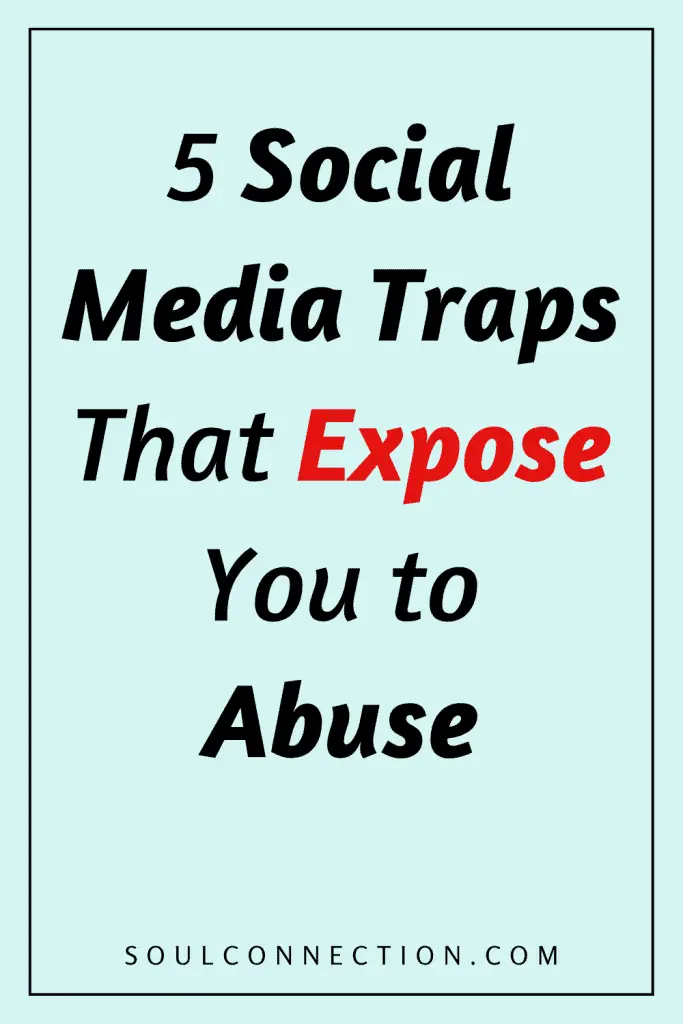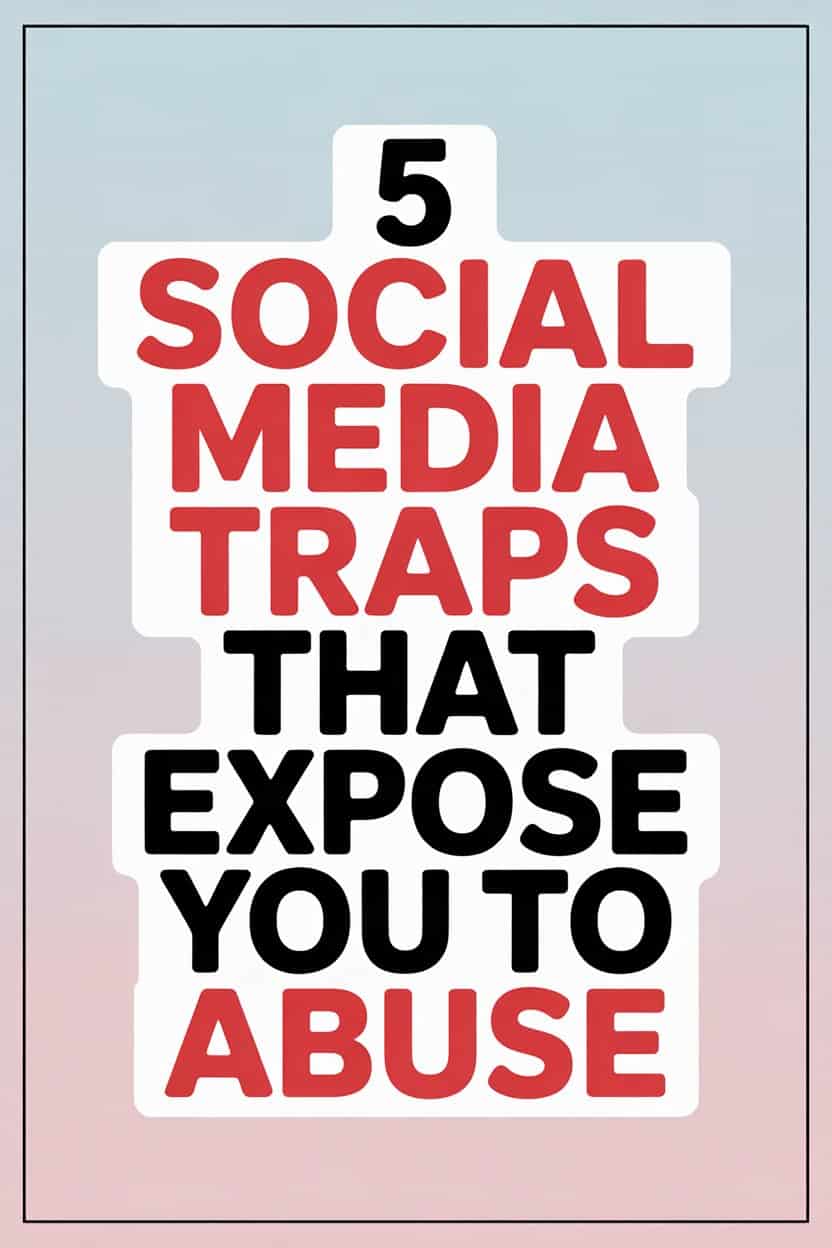Social media promised us endless connection and a daily highlight reel. Instead, it sometimes delivers trolls, gaslighting, and more drama than a reality TV marathon.
In the world of DMs and likes, it’s surprisingly easy to fall into online traps that leave you vulnerable to emotional abuse, manipulation, and even worse. Time to call out the five big ones, and more importantly, how to protect yourself.
1. The Perfect Life Illusion
Scrolling through your feed, envy creeps in as everyone else’s lives look shinier, happier, and suspiciously filter-perfect.
Coffee dates with flawless friends, romances with more rose petals than a florist’s bin, holidays where nobody forgot the sunscreen or the kids. Cue the comparison trap.
But underneath those glowing posts? There’s often a heap of insecurity, strategic cropping, and sometimes, outright fakery.
Abusers and narcissists adore this illusion—they carefully curate their image, then use it to gaslight or belittle others. “Why can’t you be more like her?” “Everyone else is happy with me.” It’s weaponized perfection.
Those idealized posts can also lure you into relationships with people who aren’t what they seem—a classic “catfish” scenario, or worse, someone who uses their sparkling image to manipulate and control.
Once you’re hooked, it’s easier for them to play games, guilt-trip, or isolate you.
What helps:
- Limit the doomscrolling, especially when feeling low.
- Remind yourself that filters don’t fix character flaws.
- Notice if someone’s using their social shine to shame or control you. That’s not connection; that’s manipulation.
2. The Subtle Shaming Game
Not every abusive message screams at you in all caps. Social media is ripe with subtler forms of shaming and manipulation—think vagueposts, “jokes” at your expense, or a suspicious lack of likes and comments when you share something important.
Abusers love to post thinly veiled digs or “inspirational” quotes that hit a little too close to home.
Maybe your partner shares a meme about “clingy girlfriends” right after you voice concerns. Or a friend’s cryptic post about “fake people” lands just after your falling out. Coincidence? Not likely.
This roundabout shaming can make you doubt your worth or feel isolated without ever being directly attacked. The beauty (and curse) of social media: plausible deniability.
“Oh, that wasn’t about you! You’re so sensitive.” Classic gaslighting.
What helps:
- Trust your gut if you sense a post is aimed at you.
- Block, mute, or snooze anyone who habitually makes you feel small—even if they’re “just joking.”
- Resist the urge to play detective or demand explanations; some games aren’t worth playing.
3. The Oversharing and Stalking Spiral
Sharing photos, stories, and life updates is the whole point, right? But oversharing personal details can attract the wrong kind of attention.
Some people use your digital breadcrumbs to monitor, control, or even harass you.
Maybe it starts with “liking” every post, chiming in on every story—flattering, until it begins to feel invasive. Later, it might escalate to tracking your location tags, demanding to know who you’re with, or guilting you for not responding instantly.
Suddenly, that romantic “just checking in” is more Big Brother than boyfriend.
Social media stalking isn’t just for exes with too much time on their hands. Abusive partners can—and do—weaponize your posts to keep tabs on you, harass your friends, or twist your words against you in arguments.
What helps:
- Review your privacy settings. Restrict what strangers (and even some “friends”) can see.
- Avoid tagging locations in real time. Post that brunch photo when you’re back home, not while you’re still on your second mimosa.
- Block anyone who uses your own posts to control, harass, or guilt-trip you. That “unfriend” button exists for a reason.
4. Love-Bombing and Public Declarations
Public displays of affection can be charming—until they start to feel like a performance.
Some abusers weaponize grand gestures online: posting sappy tributes, tagging you in everything, showering you with praise, and filling your feed with “my world, my everything” captions.
At first, it feels intoxicating. Who wouldn’t want to be adored on the internet?
But if those posts come with pressure—“Why didn’t you comment on my story?” “Post about us or I’ll think you’re hiding me”—the love-bombing quickly becomes a means of control.
It’s all about image management. Narcissists love to create a fairytale romance for the world to admire, while keeping the private relationship full of stress, gaslighting, or even threats.
The more you buy into the online fantasy, the more trapped you can become behind the scenes.
What helps:
- Pause before matching public declarations. Love should feel safe, not staged.
- Notice if online affection feels conditional: Are you free to say no, or does refusing start a fight?
- Remember, real intimacy thrives in private, not just in the comments section.
5. The Silent Treatment and Social Freeze-Out
One of the nastier tricks in the social media playbook is freezing someone out—unfriending, unfollowing, or suddenly leaving your messages on “read.”
It’s the modern equivalent of turning away in the cafeteria, except now everyone can see it.
Abusers exploit this to punish, control, or manipulate. Maybe your partner blocks you after a disagreement, then reappears as if nothing happened—leaving you anxious and desperate to make amends.
Or a “friend” removes you from the group chat for no clear reason. The point isn’t to solve a problem; it’s to make you squirm.
Sometimes, it’s less obvious: excluding you from shared photos, not tagging you in group events, or going radio-silent when it matters most. It’s a way to remind you of your place—and who holds the power.
What helps:
- Avoid begging to be let back in. Take a breath and remember that healthy relationships don’t rely on threats or public shaming.
- Seek support offline. Chat with people who value you outside the digital bubble.
- Mute, block, or unfollow anyone who doles out affection or attention as punishment or reward.
Turning the Tables on Social Media Manipulation
If social media sometimes feels like a minefield, you’re not imagining it. Abusers have flocked to these platforms because they offer new and creative ways to control, shame, and isolate.
But don’t hand over your power. Your feed, your rules. Curate your digital life like your living room: keep the people who spark joy, and show the door to anyone who brings drama or control.
Trust those gut instincts—if a post, comment, or message leaves you feeling uneasy, that’s a clue. Privacy settings aren’t just for tech nerds; they’re your digital lock and key.
And when relationships get messy, remember: no one deserves to be manipulated, shamed, or frozen out—online or off.
Social media should be a place to connect, laugh, and build each other up (with a side of cat videos, naturally). Don’t let anyone twist it into a tool for abuse.
If they try, there’s always the block button—and in extreme cases, the authorities.
Your online world belongs to you. Take it back, one unfollow at a time.


